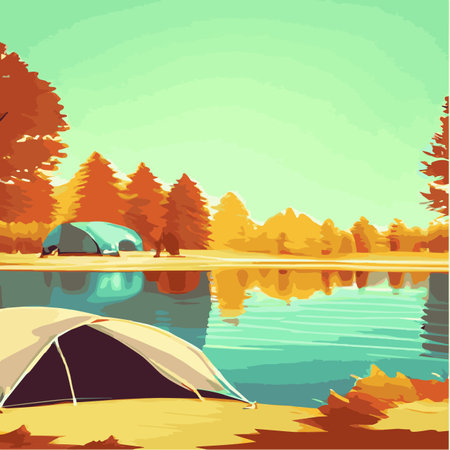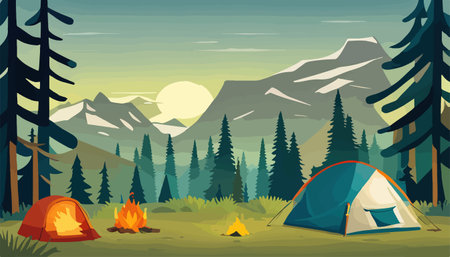Introduction to Multi-Fuel Grills
If you’re the sort of camper who likes a bit of variety in your outdoor cooking, multi-fuel grills are quickly becoming the kit to watch. Unlike traditional barbecues that tie you down to either charcoal or gas, these clever grills let you switch between different fuel sources – think charcoal, wood, gas canisters, or even eco-friendly briquettes. It’s this flexibility that’s winning over UK campers, especially those who want to keep their options open whether theyre pitching up at a festival, wild camping in the Lakes, or just having a proper cook-up at a campsite down Cornwall. As Brits look for more ways to enjoy al fresco dining (rain or shine!), multi-fuel grills offer the freedom to adapt to whatever’s in your boot or what the campsite rules allow. In this review series, we’ll dive into how these versatile grills work and why they’re fast becoming an essential bit of kit for anyone who takes their outdoor meals seriously.
2. Key Features that Matter Out in the British Countryside
When it comes to choosing a multi-fuel grill for your camping adventures across the UK, there are several features that can make or break your experience—especially when faced with unpredictable weather and varying campsite regulations. Here’s a practical breakdown of what to look out for:
Fuel Options: Flexibility Is King
One of the biggest draws of multi-fuel grills is their versatility in fuel choices. Whether you’re keen on that classic smoky flavour from charcoal, the convenience of gas, or even using locally sourced wood, being able to switch fuels gives you a real edge in adapting to different conditions. Some campsites may have restrictions on open flames or specific fuels due to fire risk, particularly during dry spells—so having options is crucial.
| Fuel Type | Pros | Cons |
|---|---|---|
| Charcoal | Rich smoky taste; widely available | Takes time to heat up; messy cleanup |
| Wood | Aromatic flavours; can use local resources | Can be restricted in some sites; variable heat control |
| Gas (Butane/Propane) | Quick start; easy temperature control; clean burning | Might require carrying extra canisters; less ‘authentic’ flavour |
Portability: Navigating the British Terrain
The best grill is one you can actually bring along. With the rolling hills of the Lake District or remote Scottish bothies in mind, portability becomes essential. Look for grills with foldable legs, compact designs, and lightweight builds. Sturdy handles and carry bags are a bonus when trekking over muddy fields or squeezing kit into a packed car boot.
Weight & Size Comparison (Typical Ranges)
| Grill Type | Packed Size (cm) | Weight (kg) |
|---|---|---|
| Compact Tabletop | 45 x 30 x 20 | 4-6 |
| Folding Portable Stand | 60 x 40 x 25 | 7-10 |
Ease of Cleaning: Less Time Scrubbing, More Time Relaxing
No one wants to spend ages cleaning up after a long day hiking through the Peak District. Removable ash pans, dishwasher-safe grates, and non-stick surfaces are all worth considering. If you’re likely to encounter soggy ground or persistent drizzle (let’s face it, this is Britain), opt for models that don’t require intricate disassembly out in the open.
Campsite Restrictions & Weather Considerations
The British climate is famously fickle—from sudden downpours to blustery winds. Choose grills with windshields or adjustable vents for better flame control. It’s also wise to check campsite rules before heading off: some places only allow gas or prohibit disposable BBQs entirely due to environmental concerns.
Checklist: Must-Have Features for UK Camping Grills
- Multiple fuel compatibility (charcoal, wood, gas)
- Lightweight and easy to pack down
- Sheltered cooking area or built-in windbreaks
- User-friendly cleaning system
- Campsite-compliant safety features
Selecting a grill that ticks these boxes will keep your camping meals stress-free, whatever the British weather—or campsite warden—throws at you.

3. Putting Versatility to the Test: Real-World Grilling Scenarios
If you’re camping in the UK, grilling isn’t just about sunshine and sausages—it’s about adapting to whatever Mother Nature throws at you. Over the past few months, I’ve put several multi-fuel grills through their paces across a real cross-section of British campsites: think muddy festival fields in Somerset, windswept Cornish clifftops, and even the wild, unpredictable weather of the Scottish Highlands.
Hands-On Experience Across Different Fuels
One of the biggest perks of a multi-fuel grill is flexibility. I’ve switched between charcoal for that authentic smoky flavour, wood when it was available (and dry enough!), and gas canisters for those quick setups when rain clouds rolled in. In a pinch, being able to swap fuel types meant I never had to pack up hungry or disappointed—especially after a long day hiking or paddleboarding.
Dealing with Unpredictable British Weather
The UK’s weather can turn on a sixpence. During one trip in Northumberland, I started grilling burgers on charcoal under blue skies, only for rain to descend an hour later. With a simple switch to gas, I finished cooking without missing a beat—no faffing about with wet coals or soggy matches. These grills really shine when you need a hot meal and don’t have time to wait for ideal conditions.
Campsite Setups: From Festivals to Rugged Glens
Whether you’re squeezed between tents at Glastonbury or setting up beside a loch in Scotland, campsite conditions vary wildly. Some sites ban open fires but allow gas; others are happy with wood as long as you keep it contained. The best multi-fuel grills let me adapt easily—I could go smokeless when needed or make the most of local firewood when rules allowed. For campers who like a bit of adventure and variety, this versatility is hard to beat.
Cultural Fit: British BBQ Tastes and Traditions
When it comes to outdoor cooking in the UK, barbecuing is more than just a summer pastime—its a cherished ritual that brings friends and families together. Multi-fuel grills are quickly becoming favourites among British campers because they cater brilliantly to our unique grilling preferences and ever-changing weather. Whether you’re at a campsite in Cornwall or hosting a picnic in the Lake District, these versatile grills make it easy to serve up classic Brit BBQ fare, whatever the elements throw at you.
How Multi-Fuel Grills Suit British BBQ Staples
| Classic BBQ Food | Popular Cooking Style | Multi-Fuel Grill Advantage |
|---|---|---|
| Sausages (Cumberland, Lincolnshire) | Slow-cooked over gentle heat | Charcoal for smoky flavour; Gas for consistent heat on rainy days |
| Burgers | Quick sear, then finish over lower heat | Switch between gas for speed and wood/charcoal for authentic taste |
| Veggie Skewers (peppers, mushrooms, halloumi) | Even grilling with minimal flare-ups | Precise temperature control prevents burning delicate veg |
| Chicken drumsticks & wings | Crispy skin, thoroughly cooked inside | Start on high gas heat, finish with charcoal for crispiness and flavour depth |
| Fish (mackerel, salmon) | Gentle grilling to avoid sticking/flaking | Wood chips add subtle smoke; adjustable racks suit fish fillets perfectly |
A Nod to Tradition with Modern Flexibility
British barbecue culture thrives on variety—one minute you’re tossing sausages for the kids, the next you’re slow-cooking veggie skewers or experimenting with seafood. Multi-fuel grills allow you to switch fuels mid-session if the weather changes or if you fancy infusing different flavours into your food. For example, you might start off burgers on gas for speed when rain clouds threaten, then move to charcoal as soon as the sun peeks through. That sort of flexibility means you never have to compromise on taste or atmosphere. And let’s be honest: nothing says “British summer” quite like standing around a sizzling grill under an umbrella!
5. Pros, Cons, and Things to Watch Out For
If you’re weighing up whether a multi-fuel grill is worth packing for your next camping trip across the UK, here’s an honest round-up of what works well and where things get a bit tricky.
Advantages: Why Multi-Fuel Grills Shine on British Campsites
Flexibility in Any Weather: The unpredictability of British weather means it’s handy to have options. Multi-fuel grills let you swap between charcoal for those classic smoky flavours, gas for quick-and-easy cooking when it’s chucking it down, or even wood if you fancy a rustic touch.
Adaptable for Any Location: Whether you’re pitched up at a wild site in the Highlands or making use of the facilities at a well-appointed caravan park in Cornwall, being able to switch fuels means you’re not caught out by local restrictions or shop shortages.
Packed with Features: Many models come with extras like adjustable vents, built-in thermometers, and easy-clean trays – all of which make outdoor cooking less faff and more fun.
Drawbacks: Where Multi-Fuel Grills Can Fall Short
Weight and Size: While brilliant for car campers, these grills are often bulkier than their single-fuel mates. If you’re trekking or cycle-camping, lugging one about can be a right pain.
Learning Curve: Mastering the different fuel types takes practice. Getting consistent heat with wood or charcoal (especially in windy or damp conditions) can be frustrating – expect a few burnt sausages before you get it spot on.
Price Tag: Versatility comes at a cost. Multi-fuel grills tend to be pricier than simpler models, so it’s an investment rather than an impulse buy.
Things British Campers Should Keep an Eye On
Local Regulations: Some sites restrict certain fuels – gas is often fine, but open flames from wood or charcoal may be banned during dry spells. Always check ahead to avoid disappointment.
Spares and Refills: Make sure your chosen grill uses fuels that are readily available in the UK. Butane canisters are common at most petrol stations, while decent charcoal is usually easy to find at supermarkets or garden centres.
The Bottom Line
A multi-fuel grill can be a game-changer for campers who love variety and don’t want to be limited by the Great British weather. Just weigh up the convenience against the bulk and cost—and always plan your fuel around where you’re headed.
6. Is It Worth the Investment?
When weighing up whether a multi-fuel grill is worth the outlay, it really comes down to your camping style and how much you value versatility in the great British outdoors. For those who like to keep things simple—say, sticking to well-maintained campsites with solid facilities—a single-fuel grill might tick all the right boxes, especially if you rarely stray from one type of fuel. However, if you’re the sort who ventures off-grid, enjoys wild camping in the Lake District or impromptu beach barbies on the Cornish coast, a multi-fuel grill offers flexibility that’s hard to beat.
Who Stands to Benefit Most?
Multi-fuel grills are best suited for campers who crave freedom—those who might find themselves short on gas canisters but have access to firewood, or need to adapt quickly when plans change due to unpredictable British weather. If you’re travelling as a group or with family, having backup options for fuel can be a real game-changer when you don’t want to rely on local shops being open or fully stocked.
When to Opt for Multi-Fuel
If your adventures often take you off the beaten track or you fancy longer trips where resupplying isn’t always practical, multi-fuel is an obvious choice. Likewise, those who love experimenting with different cooking styles—grilling over charcoal for smoky flavour one day, then quickly firing up gas for breakfast the next—will appreciate having options at their fingertips.
Value for Money: The UK Perspective
While multi-fuel grills typically come with a higher price tag than their single-fuel counterparts, many UK outdoor enthusiasts reckon the investment pays off in peace of mind and sheer adaptability. Factor in our famously variable weather and sometimes patchy rural supply chains, and it’s clear that being able to switch between fuels can save both hassle and extra expense down the line. In summary: if you camp regularly in varied locations or simply want maximum flexibility, a quality multi-fuel grill is likely worth every penny.


